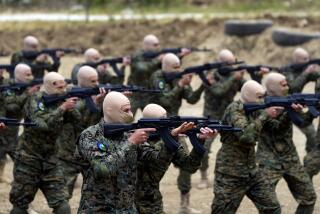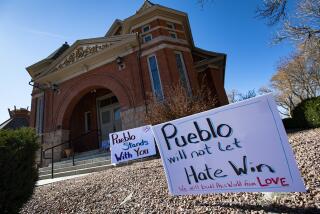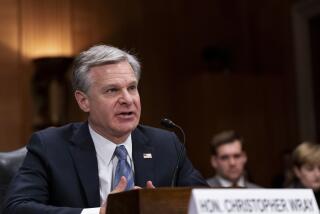Pakistan’s President Could Confront Axis of Extremists
- Share via
ISLAMABAD, Pakistan — President Pervez Musharraf faces an ominous new challenge to his rule from three Islamic militant groupings that now stand against him, each clearly capable of using violence to bring him down, diplomats and others following developments in Pakistan believe.
The presence of an undetermined number of fighters from Osama bin Laden’s Al Qaeda terrorist network who fled to Pakistan last winter after the Taliban regime’s collapse in neighboring Afghanistan merely adds to the volatile brew.
Those who track Pakistan’s turbulent domestic political environment worry openly about a nightmare scenario--one in which elements from the three diverse strains of militancy set aside their individual causes, link up with Al Qaeda members and unite around a set of shared objectives: removing Musharraf, a key U.S. ally in the war on terror; destabilizing the country; and driving the United States from the region.
Two of these groups--one consisting of Pakistanis who fought with the Taliban in Afghanistan, the other made up of Muslim holy warriors dedicated to capturing all of the disputed Kashmir region for Pakistan and the Islamic cause--were once de facto allies of Musharraf’s government.
The third--extremists from Pakistan’s majority Sunni sect who have waged a bloody, mafia-style war against the minority Shiites--was already at odds with him.
The dangers posed by these extremist groups have increased sharply in recent weeks because of steps taken to ease the crisis with India over Kashmir, diplomats and others following developments in Pakistan believe.
To reduce those tensions, Musharraf intensified a crackdown on militants whom the Pakistani government had for years trained for attacks on Indian-controlled areas of Kashmir.
With this crackdown coming just nine months after Musharraf withdrew his government’s support for the Taliban, angry and disillusioned sympathizers of both the Afghan and Kashmiri causes view the president, a general who took power in a coup, as a traitor to militant Islam.
There are about 1,000 uniformed Americans and a large FBI contingent based here as part of the war on terrorism, so the United States has a large stake in Pakistan’s internal stability.
At a different level, Americans also have a stake in a political struggle being watched across the Muslim world--that of a leader who cast his fate with the West in the wake of Sept. 11 and is now locked in a battle to survive the backlash.
Some observers believe that informal linkups between militant groups may already have begun.
Communications Minister Javed Ahraf Qazi, the former head of Pakistan’s Inter-Services Intelligence agency, or ISI, said that this month’s bombing at the U.S. Consulate in Karachi had the earmarks of cooperation between local religious extremists and Al Qaeda refugees believed to be in the rough port city.
“My suspicion is that sectarian elements did this at the behest of Al Qaeda,” he said. “They are [both] ruthless murderers.”
Presidential spokesman Rashid Qureshi acknowledged, “Some [Pakistani] groups may have developed Al Qaeda links.”
So far, there is no hard evidence that followers of the three militant causes have entered into any formal agreement or established anything as structured as a common underground network to pursue their shared goals.
With Al Qaeda and Pakistani Taliban fighters in disarray, the heads of several large Sunni groups in jail and many Kashmiri militants only now beginning to contemplate an alternative future, organizational leadership is in short supply, according to those who monitor militant activities.
They believe that, instead, little more than a camaraderie among individuals attracts the militants together as small groups explore possible cooperation.
“Al Qaeda elements and others are now in the process of coming together to find a specific-oriented agenda,” said Aamer Ahmed Khan, editor of the Herald, a Karachi-based monthly that closely follows the activities of Islamic militant groups. “Some leaders haven’t even met yet, but groups are starting to work together.”
A previously unknown group calling itself Al Qanoon--”The Law”--claimed responsibility for the consulate attack. In a note faxed to local newspapers, it described the bombing as the beginning of a campaign against “America, its allies and its lackey Pakistani rulers.”
Although no one has claimed responsibility for a bombing last month outside the Sheraton Hotel in Karachi that killed 11 French defense contract workers, authorities talk privately of a possible similar nexus in that attack.
Musharraf’s government pressed its search for Al Qaeda remnants in the wake of the U.S. Consulate attack.
Last week, precinct-level police officers in all four provinces were called to urgent meetings where superiors ordered them to search for possible links between known Sunni militants in their areas and Al Qaeda members who might have found refuge there.
A senior Interior Ministry source said that as part of the search, landlords have been told to report to police any tenants willing to pay conspicuously more than the market rate for accommodations.
The government also has invoked longer-term measures to choke off support for Islamic extremists.
A tough new law announced last week tightens controls on the thousands of religious schools, known as madrasas, and cuts off foreign sources of funding to them. With financial help from foreign-based Islamic fundamentalist organizations, many of Pakistan’s madrasas instilled their students with extremist ideas heavily laced with anti-Americanism.
Authorities have also launched investigations into the activities of several Pakistan-based nongovernmental organizations funded by Arab world money suspected in recent months of providing aid and shelter to fleeing Arab Al Qaeda fighters and their families.
So far, no one has linked Kashmiri militant groups to the string of recent attacks against foreigners in Pakistan, primarily because their break with Musharraf has only just occurred. But many fear that the potential is now there.
“There’s a very serious danger of the government losing control over the Kashmiris,” said Aamer. “It’s a major failure that the government didn’t prevent the Kashmiri freedom movement from being infiltrated by these [other] militants.”
Veteran Pakistan-based diplomats claim that Musharraf had already decided before Sept. 11 to end the government’s support of Muslim extremist elements in the country because the price in terms of domestic violence and a growing international isolation had become too high. His strategy, however, had been to take on the militants quietly.
“He wanted to finish them off one by one,” noted a respected Islamabad-based Arab envoy. “Now he has been forced to fight on three fronts simultaneously. Politically, this could be dangerous.”
So far, the extremist groups have made no public statements or issued any credible claims regarding their intentions. But previous shared ties could help bring them together despite their different political agendas, diplomats and analysts fear.
Evidence of these ties abounds.
For example, Kashmiri militants and Sunni sectarian extremists from Pakistan were routinely trained at Al Qaeda-run camps in eastern Afghanistan. In fact, there is now evidence that at least one of the terrorist camps in eastern Afghanistan hit by U.S. cruise missiles in 1998 was training recruits for Kashmiri militant groups, not Al Qaeda. The U.S. attack came as a reprisal for the American Embassy bombings in East Africa.
In addition, Pakistani journalists who trekked across the mountains into eastern Afghanistan for a May 1997 news conference with Bin Laden recall that their guides and hosts for the trip were members of the Kashmiri militant organization Harkat Moujahedeen.
“The collective experience of having trained and fought together has led to a camaraderie,” said a senior member of Musharraf’s government who declined to be identified. “This camaraderie is now playing itself out.”
U.S. and Pakistani authorities have had some notable successes in the search for Al Qaeda operatives in Pakistan in recent months. A raid in the Punjab city of Faisalabad in March netted a senior Bin Laden aide, Abu Zubeida. U.S. officials say that information provided by Zubeida led to last month’s arrest of Jose Padilla, the so-called “dirty bomber.”
Despite this, senior Pakistanis worry whether their security forces are up to a major confrontation with militants on the home front. The police, they say, are ill-equipped, overextended and so corrupt that the government has come to rely increasingly on paramilitary units such as the Pakistani Rangers to carry out sensitive tasks.
Interior Minister Moinuddin Haider admitted that his forces aren’t in good shape.
“I have my problems about police capabilities,” he said. “I used to get help from the [paramilitary forces], but they are now on the border. So I’m left with a police force which has been tired ever since September, when hundreds of thousands of [protesters] came onto the streets.”
Haider said he had requested additional resources to beef up both the manpower of the police and their investigative capabilities.
“We don’t want the land of Pakistan to be used by any militants, extremists or terrorists,” he said. “This is the policy of our president, and we’ll do our best to implement it.”
More to Read
Sign up for Essential California
The most important California stories and recommendations in your inbox every morning.
You may occasionally receive promotional content from the Los Angeles Times.













